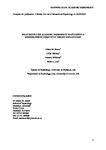What motivates academic dishonesty in students? A Reinforcement Sensitivity Theory explanation.

Date
2019-02-11Author
Subject
Metadata
Show full item recordAbstract
<jats:sec><jats:title>Background</jats:title><jats:p>Academic dishonesty (<jats:styled-content style="fixed-case">AD</jats:styled-content>) is an increasing challenge for universities worldwide. The rise of the Internet has further increased opportunities for students to cheat.</jats:p></jats:sec><jats:sec><jats:title>Aims</jats:title><jats:p>In this study, we investigate the role of personality traits defined within Reinforcement Sensitivity Theory (<jats:styled-content style="fixed-case">RST</jats:styled-content>) as potential determinants of <jats:styled-content style="fixed-case">AD</jats:styled-content>. <jats:styled-content style="fixed-case">RST</jats:styled-content> defines behaviour as resulting from approach (Reward Interest/reactivity, goal‐drive, and Impulsivity) and avoidance (behavioural inhibition and Fight–Flight–Freeze) motivations. We further consider the role of deep, surface, or achieving study motivations in mediating/moderating the relationship between personality and <jats:styled-content style="fixed-case">AD</jats:styled-content>.</jats:p></jats:sec><jats:sec><jats:title>Sample</jats:title><jats:p>A sample of <jats:styled-content style="fixed-case">UK</jats:styled-content> undergraduates (<jats:italic>N</jats:italic> = 240).</jats:p></jats:sec><jats:sec><jats:title>Method</jats:title><jats:p>All participants completed the <jats:styled-content style="fixed-case">RST</jats:styled-content> Personality Questionnaire, a short‐form version of the study process questionnaire and a measure of engagement in <jats:styled-content style="fixed-case">AD</jats:styled-content>, its perceived prevalence, and seriousness.</jats:p></jats:sec><jats:sec><jats:title>Results</jats:title><jats:p>Results showed that <jats:styled-content style="fixed-case">RST</jats:styled-content> traits account for additional variance in <jats:styled-content style="fixed-case">AD</jats:styled-content>. Mediation analysis suggested that <jats:styled-content style="fixed-case">GDP</jats:styled-content> predicted dishonesty indirectly via a surface study approach while the indirect effect via deep study processes suggested dishonesty was not likely. Likelihood of engagement in <jats:styled-content style="fixed-case">AD</jats:styled-content> was positively associated with personality traits reflecting Impulsivity and Fight–Flight–Freeze behaviours. Surface study motivation moderated the Impulsivity effect and achieving motivation the <jats:styled-content style="fixed-case">FFFS</jats:styled-content> effect such that cheating was even more likely when high levels of these processes were used.</jats:p></jats:sec><jats:sec><jats:title>Conclusions</jats:title><jats:p>The findings suggest that motivational personality traits defined within <jats:styled-content style="fixed-case">RST</jats:styled-content> can explain variance in the likelihood of engaging in dishonest academic behaviours.</jats:p></jats:sec>
Description
Collections
Publisher
Place of Publication
Journal
Volume
Issue
Pagination
Recommended, similar items
The following license files are associated with this item:

